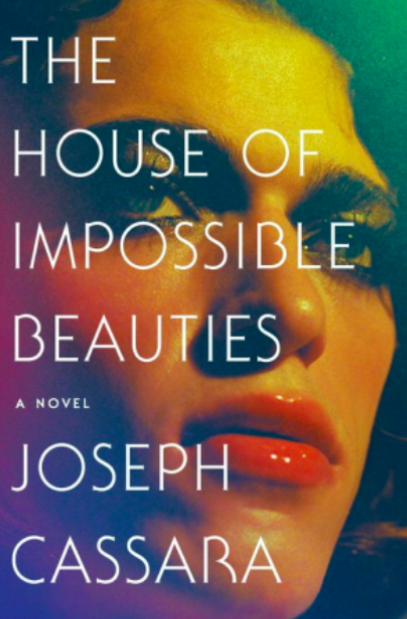Category Is—Family, Love, and Heartbreak: The House of Impossible Beauties by Joseph Cassara
Christopher Alonso
 Ecco/Harper Collins, 416 pages
Ecco/Harper Collins, 416 pages
Most readers understand the feeling of opening a book, and by the end of the first page, knowing it’s the one they’ve been waiting for. It just feels right, and, as a Miamian would say, “Dassit!” Such was my experience in reading Joseph Cassara’s glittering debut novel, The House of Impossible Beauties, a fictional account of the legendary House of Xtravaganza, brought to popular consciousness by the 1990 documentary, Paris Is Burning, which immortalized the drag ball-circuit in Manhattan. The novel follows Angel, mother and founder of the House of Xtravaganza, and Venus, Daniel, and Juanito, the runaway teenagers she takes in as her “children,” to form a kind of family. The novel imagines Angel’s and Venus’s struggles as transwomen, the excitement of the New York ball circuit, how they create the first all-Latino house within that space, as well as how the House members come to rely on each other in a violent world.
Those familiar with the history of drag will discover references to iconic queens, like Pepper Labeija, Paris Dupree, and Dorian Corey, who narrates portions of the book. Cassara fills in the world around and outside the ball scene, like painting Juanito’s first walk on the runway in an outfit he made himself, with an accessory loaned to him by Pepper Labeija. When Juanito wins, “Pepper came up behind [Juanito] and held out the big trophy and the thing was huge he didn’t know how he would lug it home in one piece and Pepper hugged him and the whole room was love love love love love.” What Cassara does so well throughout the novel is show the love and support within the community. The balls are one of the few spaces where a queer person is allowed to be unapologetically open about their identity rather than fear the violence and discrimination they might face in public.
Negative attitudes and violence against transwomen, specifically transwomen of color, echo throughout the novel, creating a heightened sense of danger and a hyperawareness that at any moment something awful could happen, and it does. Cassara does not shy away from the truths of many queer and trans people during the late eighties—drug use, working the streets, AIDS, and not being able to afford treatment. Several secondary characters die from the virus and its related complications, including Angel’s partner, Hector, who helped found the House. Through the turbulence of these events, it is Dorian who reminds readers, “we all need to face the fact that the whole world isn’t a giant ball…we’ve all got to face the reality of the situation before us. And that reality is a harsher one.”
While some characters are recreations of historical figures, the novel speaks of a generation of queer people misrepresented or hidden from view. Throughout the novel, Cassara peppers Spanish words in and out of dialogue, in a way, queering the narrative and reminding readers of the world and culture they’ve stepped into. With so much of current queer media representations focusing on white men from comfortable means, there are few depictions of the experiences of queer people of color. Cassara’s novel is a brutal reminder of how difficult it can be for a Latinx person to survive in a culture that aims to suppress their existence. Angel’s mother does not support her life and repeatedly misgenders her. Juanito suffers unspeakable childhood trauma from family. These experiences shape the characters in invisible ways and show how the hypermasculinity so pervasive in Latinx communities can cause irreparable damage.
Beauties is about love and family, both bound by blood and the family one chooses. It is about heartbreak, about life’s unbearable cruelty, and still, we read on even as the characters spiral toward terrible ends. It’s also about the resilience of a community that has faced immeasurable hardships and the hope they continue to carry in a world that is still unkind to those who do not fit the heteronormative status quo.
This book will show readers the world beyond the camera lens of Paris Is Burning and remind them of those who paved the way for freedom of self-expression. As a gay Latinx man whose notion of the fate of queer people has been one of doom—hope never crossed my mind—, this book reaffirms my love for my community. And at a time when trans lives and the lives of queer people of color are terrorized around the world, Beauties reminds readers that these tragedies are not in the distant past. Cassara has crafted a glory of a book that will stick with readers long after its final chapter. I am impatiently awaiting Cassara’s next work.
Christopher R. Alonso was born in Miami to a Cuban family. He is a student of fiction at the Northeast Ohio MFA program and the current fiction editor at Jenny Magazine.










